The Partnership for Gender Equity (PGE), with the support of a group of coffee and cocoa partners including 4C, aims to develop and launch a new tool called the “Gender Equity Index”. It will support companies and organizations which provide services and technical expertise to farmers and farmer groups, enabling them to effectively reach more women.
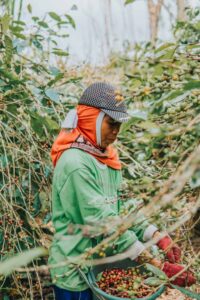 Over 70,000 women cultivate and process 4C certified coffee around the world. The 4C standard prohibits discrimination on a gender basis and ensures that the procedures to act against discrimination and harassment are in place. To strengthen its work on gender equality, 4C has partnered with PGE to support the development of the “Gender Equity Index”.
Over 70,000 women cultivate and process 4C certified coffee around the world. The 4C standard prohibits discrimination on a gender basis and ensures that the procedures to act against discrimination and harassment are in place. To strengthen its work on gender equality, 4C has partnered with PGE to support the development of the “Gender Equity Index”.
Starting from November 2020, 4C has been working on the development of verifiable criteria on gender equality in coffee production to be added to its core certification on a voluntary basis. These criteria will be applied to identify gender inequalities at farms and create action plans, following the continuous improvement framework of the 4C standard. Participating 4C System users will also be able to make credible claims with regards to sustainable 4C certified coffee products which promote gender equality, thus, highlighting their efforts in this area.
The purpose of the “Gender Equity Index” of PGE is to evaluate the design and implementation of advisory and extension services, helping provider organizations to integrate and expand the topic of gender equity in their programs. The “Gender Equity Index” diagnostic will offer recommendations and resources to assist service providers as they prioritize action to address identified gaps.
“Although the 4C Code of Conduct already has a strong linkage to UN SDG 5 on Gender Equality (ITC 2020), we see further potential to deeper address the existing disparities and promote women empowerment on a global scope,” – said Norbert Schmitz, Managing Director at 4C Services GmbH. – “We are hopeful that with this partnership we can contribute to the development of the Gender Equity Index and obtain learnings to strengthen the 4C sustainability standard in terms of gender equality and empowerment of women in the coffee sector.”
Kimberly Easson, CEO at PGE said, “The development of the Gender Equity Index will benefit from input and experience of the 4C team. Their in-kind and financial contribution reflects an understanding that sustainability projects must consider gender in order to drive impact.”
Greg Meenahan, Co-Developer of the Gender Equity Index said, “This represents the first commitment from a sustainability certification organization. It’s a recognition that gender equality needs to move past specific “gender projects” and become seamlessly woven into all sustainability projects and investments.”
About 4C:
4C is a leading sustainability certification scheme for the coffee industry. 4C certification focuses on good agricultural and management practices, including requirements on economic, social and environmental conditions for coffee production and processing in order to establish credible sustainable and transparent supply chains.
About PGE:
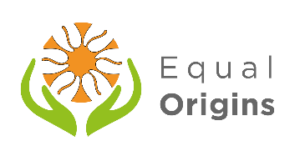
The Partnership for Gender Equity (PGE) is creating common tools and methodologies to support the coffee and cocoa industries’ engagement and investment in gender equity across the value chain. These tools will serve to improve the livelihoods of producers and enhance the sustainable supply of quality coffee. Their evidence-based approach comprises three core elements: a validated set of tools, a common language for gender equity and a platform for action that supports scalable investments and action across the sector.
Further Information – Downloads and Links
4C talked to “Coffee and Tea in Russia” and shared some insights into the 4C standard, its history, and how 4C works towards more sustainability in the coffee sector.
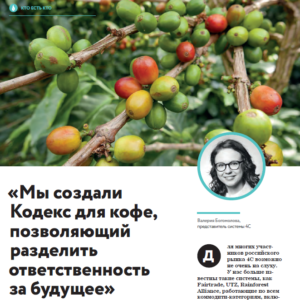 Being one of the global leading systems for certification of sustainable coffee cultivation and processing, 4C plans to strengthen the involvement of market participants in protecting nature, strengthening labor rights, and supporting stable incomes. In her interview for “Tea and Coffee Magazine in Russia”, Valeriia Bogomolova talks about how 4C works and what benefits it creates.
Being one of the global leading systems for certification of sustainable coffee cultivation and processing, 4C plans to strengthen the involvement of market participants in protecting nature, strengthening labor rights, and supporting stable incomes. In her interview for “Tea and Coffee Magazine in Russia”, Valeriia Bogomolova talks about how 4C works and what benefits it creates.
For many participants in the Russian market, 4C may not be very familiar. We have heard of such systems as Fairtrade, UTZ, and Rainforest Alliance, which work in all commodity categories, including coffee. Can you tell us where 4C started?
The Common Code of Coffee Community (4C) was created as a result of extensive multi-stakeholder consultations of global coffee business participants back in 2003-2006. First, it was launched in a form of the 4C Association, declaring the need to introduce basic values into coffee production that would help preserve nature and spread sustainability along the entire chain. The 4C Association worked on several different sustainability topics. One of the key things was the creation of a traceable and independent verification system for coffee which represented the principles stated in the Code of Conduct. The logical outcome of this work was the eventual transformation of the 4C Association in 2015-2016: the 4C Code was operated by Coffee Assurance Services (CAS) while other pre-competitive activities were handed over to the Global Coffee Platform (GCP). In 2018, CAS was acquired by MEO Carbon Solutions and transformed into an independent 4C certification system, operated by 4C Services GmbH.
How does 4C differ from other certification systems?
First of all, we focus exclusively on coffee. This allows us to look deeper into the problems of the coffee industry and quickly find better solutions to meet our stated goals. Furthermore, one of the main environmental criteria for us is the protection of primary forests and areas of high biodiversity. In addition to environmental and social principles, we also put stress on farmers’ economic viability, including principles of business management, capacity development, access to services and market information, and traceability.
Let’s understand how it works. Why does a farmer need this certification?
Participation in our system is a classic win-win situation. Coffee producers are certainly interested in increasing their income and develop their business more sustainably across three well-known dimensions. We make it possible with the help of the criteria laid down in the 4C Code of Conduct, which addresses a large variety of sustainability challenges. That is, coffee certified by 4C, as a rule, costs more than alternatives. The certification procedure itself is not complicated. Any producer can apply for 4C certification and certify their farm in compliance with strict sustainability criteria of the 4C Code of Conduct. Independent auditors conduct on-site audits and evaluations to conclude with issuing a certificate or not. The cost of participating in the 4C certification system for the farmer comes down to the audit price negotiated between the farmers or their cooperative and the independent auditors. For example, in Ethiopia, the cost of the initial audit of one farmer can be 3,200 Euro, but in Brazil, it will be some other price. But I want to point out that this is the amount that the farmer pays to the auditing company, not to us.
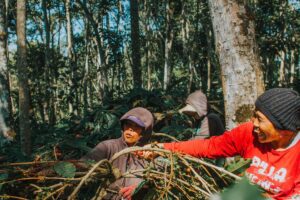
Is it that simple?
Obsivously, not everyone who comes to us initially meets the criteria of compliance Level 2 or Level 3+. That is why we have a system of continuous improvement plans, through which farmers increase their sustainability performance step by step. We are constantly monitoring the development and, thus, encourage coffee producers to improve their farm management methods and take care of people and the environment, which results in a more sustainable and profitable business and increased farmer confidence in the future.
You mentioned that you charge no certification fee. How are your operations financed in this case?
We receive payments from companies that source 4C certified coffee. There is a calculation formula, which is tied to physical volume. We keep a record of all the coffee that passes through our system, which ensures high traceability of 4C certified coffee beans.

So 4C gets its funds from traders and roasters?
Not exactly. 4C gets the financial means from the roasters, coffee brand owners, retailers, etc. Traders only have to be registered on our platform and regularly enter data on 4C coffee purchases to improve supply chain traceability. 4C’s uses its revenue primarily to improve the standard and support farmers through projects on the ground and only partially for marketing and advertising. The companies sourcing 4C certified coffee thereby contribute to a common cause and spread sustainable coffee which is grown following high standards. This is important for them because in many economically developed countries consumers are paying more and more attention not only to the quality of the product but also to the environmental and social responsibility of all those involved in its production chain. The 4C logo appears on the packaging of the finished product, and consumers can see what they support with their small contribution when they buy such a product. So, in a sense, for the image of many market operators who sell the finished product, working with such coffee is gradually becoming something of a must-have.
What is the reach of the 4Cs today? How many countries do your certified farmers work in?
We work in 23 countries. But to give you a better idea, let me give you some other figures. There are nearly 400,000 farmers around the world growing 4C certified coffee working on over 850 hectares of land. And most importantly, it’s more than 26.6 million bags of coffee a year, which is about 15-20% of world consumption.[1] Now we are actively working on increasing recognition of 4C on the consumer markets, especially the developing markets. We have corresponding programs, and we hope that Russian consumers will also soon become part of the supply chain of organic coffee, which has a high social responsibility.
You can find out more about how 4C works and what benefits the coffee sector can get by visiting the organization’s stand in the Coffee Tea Cacao Russian Expo virtual pavilion from March 11.
[1] The figures refer to the year 2019. Click here to see the latest information.
This article was originally published in Russian. To read the original version, please follow the link.

4C partners with Melitta Europa GmbH & Co. KG. – Division Coffee – and DEG to foster sustainability of the Colombian coffee production
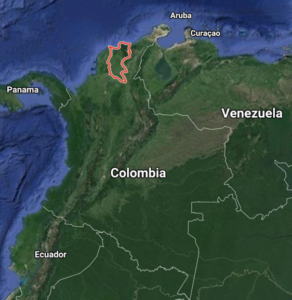
The baseline study of the develoPPP project on improving working and living conditions for coffee smallholders in Colombia has been finalized, having identified Magdalena as one of the departments with the greatest need of intervention to improve productivity and living conditions, especially when considering economic opportunities for rural youth, gender balance, productivity, access to markets and adaptation to climate change, as the baseline study conducted by the Alliance of Bioversity International and the International Center for Tropical Agriculture (ABC) revealed.
Why the department of Magdalena?
The department of Magdalena is located in the north of Colombia, with more than 4,000 coffee growers, many of them belonging to indigenous communities. Coffee producing areas in Magdalena are located in the foothills of the Sierra Nevada de Santa Marta, where the department has ecosystems and climatic conditions suitable for coffee. On average, the coffee farms have a planted area of 2.76 hectares, with an average age of coffee plantations of twelve years and an estimated proportion of 4% of coffee growers under 30 years of age.
Magdalena has been identified as the department with some of the highest rates of rural poverty, youth unemployment and lack of rural education in comparison to the other six departments assessed (Antioquia, Caquetá, Cauca, Huila, Meta, Risaralda) as well as one of the departments affected greatest by the impact of climate change, facing a high risk of deforestation of the remaining forest area.
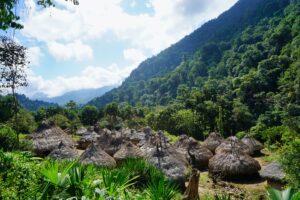
A decrease of almost 50% in suitable area for coffee production is predicted, whereas all other departments assessed were facing losses in suitable area of around 6-28%. The need for climate change adaptation and mitigation strategies and preventive measures to avoid expansion into forested or protected areas is needed, as the forested area under deforestation risk was identified to be more than 63%.
Coffee productivity in Magdalena amounts to 0.71 tons/hectare, with which it is only half of that of departments such as Antioquia, Huila and Risaralda, where the yields per hectare are above 1.4 tons. At the same time, access to international markets for coffee produced from Magdalena lags behind those of most of the other departments, representing only 2% of the total coffee exports from Colombia, in comparison to 10%-18% in the best performing departments.
“Having identified Magdalena as the project implementation region to best achieve impact on the ground and where most need for intervention exists fits perfectly into our vision to support the market access of the farmers of the project, as Magdalena is a region of high commercial interest to us. Supporting here with our project to improve the livelihoods of coffee farmers and young adults makes us very happy”, says Jan Rischkopf, Sustainability Manager at Melitta Europa GmbH & Co. KG.
The baseline study and its findings
The baseline study started with a risk analysis based on remote sensing technologies powered by Global Risk Assessment Services (GRAS) for 15 relevant coffee departments to allow for a pre-selection of higher risk regions for the in-depth baseline study. For this, data on protected areas, high carbon stock areas, potential deforestation, converted grassland and national social indices was collected and processed. A pre-selection of the above mentioned seven regions took place, based on the results of the GRAS risk assessment, as well as potential sourcing regions of Melitta and possible synergies with other similar projects.
 Within a multistakeholder workshop conducted by 4C, the findings have been presented and discussed. Challenges and improvement areas for coffee farmers and possibilities to better integrate young adults into coffee production were further elaborated and important issues to be addressed in the training program of the project were identified. Major challenges within the social, economic and environmental dimension included among others high costs of coffee production, low productivity, lack of farm and income diversification, risk of deforestation and negative impact of climate change as well as reduction in biodiversity, soil fertility and inadequate agricultural practices. The main drivers identified for young adults to migrate to the cities and leave coffee production were the unattractiveness of the coffee sector due to heavy work, low income and absence of social recognition as well as the lack of access to capital and land.
Within a multistakeholder workshop conducted by 4C, the findings have been presented and discussed. Challenges and improvement areas for coffee farmers and possibilities to better integrate young adults into coffee production were further elaborated and important issues to be addressed in the training program of the project were identified. Major challenges within the social, economic and environmental dimension included among others high costs of coffee production, low productivity, lack of farm and income diversification, risk of deforestation and negative impact of climate change as well as reduction in biodiversity, soil fertility and inadequate agricultural practices. The main drivers identified for young adults to migrate to the cities and leave coffee production were the unattractiveness of the coffee sector due to heavy work, low income and absence of social recognition as well as the lack of access to capital and land.
Magdalena’s demand for greater opportunities
Looking again into the department of Magdalena and especially the needs identified for the rural youth, the baseline study revealed the demand for greater opportunities in terms of employability, participation in projects for the creation and strengthening of initiatives and access to capital for implementing business ideas related to the coffee industry.
“Through the active participation of various actors from the coffee industry, including coffee producers, traders, roasters, NGOs and research institutions, we are glad to have received a broad input on the main challenges to be addressed within the training program that we are going to develop together with the Federación Nacional de Cafeteros de Colombia (FNC), ABC and NES Naturalzea in the coming months, as well as input on training methodologies to be applied”, highlights Myriel Camp, Program Manager at 4C Services.
Further information on the project and the results of the baseline study can be found here.
About the develoPPP program
develoPPP is a program launched by the German Federal Ministry for Economic Cooperation and Development (BMZ) in 1999 in order to foster the involvement of the private sector in areas where business opportunities and development policy initiatives overlap. DEG is one of the two official partners appointed by BMZ to implement the develoPPP program on its behalf.
Further Information – Downloads and Links
- Press Release: Magdalena to be the department for project intervention to improve working and living conditions for coffee smallholder
- Improving working and living conditions for coffee smallholders in Colombia
According to a report published by the Intergovernmental Science-Policy Platform on Biodiversity and Ecosystem Services (IPBES) in May 2019, nature is declining globally at rates unprecedented in human history. Up to one million plant and animal species face extinction due to increasing deforestation rates, climate change, pollution and other human activities. The report showcases, that the loss of biodiversity is one of the biggest challenges of our time. Intensive agriculture is considered as one of the main drivers of destruction of ecosystems, overexploitation of natural resources and contamination. Looking into coffee production, it is grown in some of the world’s biodiversity “hotspots”, which are areas of high vulnerability and biological importance. Improving biodiversity performance on coffee farms not only serves nature protection, but is also the basis for sustainable, successful, and climate change resilient coffee production.
4C, in cooperation with the Lake Constance Foundation, Agriculture and Forestry Research & Development Center for Mountainous Region (ADC), Vinh Hiep Gia Lai Co., Ltd and Fundación Humedales, has started a joint project to improve biodiversity in coffee landscapes in Vietnam.

 To achieve this objective, the Biodiversity Performance Tool (BPT) developed by the LIFE Food & Biodiversity Initiative will be adopted to the Vietnamese context and applied on different 4C certified farms to evaluate the biodiversity situation and set up and implement biodiversity action plans. The BPT is a practical instrument to realize a baseline evaluation of the situation of biodiversity on the farm, makes visible strengths and weaknesses using a classification system of thresholds and facilitates the elaboration of a biodiversity action plan.
To achieve this objective, the Biodiversity Performance Tool (BPT) developed by the LIFE Food & Biodiversity Initiative will be adopted to the Vietnamese context and applied on different 4C certified farms to evaluate the biodiversity situation and set up and implement biodiversity action plans. The BPT is a practical instrument to realize a baseline evaluation of the situation of biodiversity on the farm, makes visible strengths and weaknesses using a classification system of thresholds and facilitates the elaboration of a biodiversity action plan.
“Biodiversity protection is essential for agriculture and the future of coffee cultivation”, says Marion Hammerl, President of Global Nature Fund and Director of the Lake Constance Foundation. “The 4C Code of Conduct includes effective biodiversity criteria. Coffee farmers need support to comply with these criteria and implement an action plan of good quality. Our joint project with 4C to adopt the Biodiversity Performance Tool to the Vietnamese coffee production supports Vietnamese farmers in the elaboration of their action plans. With these activities, the 4C standard creates acceptance and capacities – both necessary to finally make progress towards the goal of halting the loss of biodiversity.”
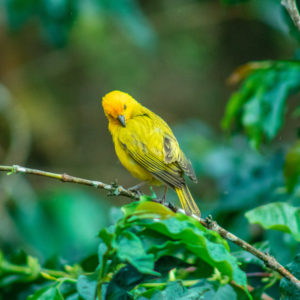 Currently, ADC is adopting the BPT to the Vietnamese context to be used during their first farm visits that will take place mid-January 2021 to conduct a baseline evaluation and identify the potential for biodiversity improvement. In the next steps, the selected biodiversity improvement measures will be implemented, monitored, and evaluated, and the BPT further adjusted to be appropriable to be used on a landscape level in Vietnam coffee cultivation. “We are proud to be a partner in this project, involving some of our farms to test the Biodiversity Performance Tool and to learn about possibilities to improve the biodiversity situation within our supplying farms, with the aim to disseminate this knowledge throughout the region for a wider positive impact on biodiversity”, confirms Certification department at Vinh Hiep Gia Lai Co., Ltd. The BPT will provide coffee farmers in Vietnam with a practicable tool to support them in their biodiversity enhancement endeavors.
Currently, ADC is adopting the BPT to the Vietnamese context to be used during their first farm visits that will take place mid-January 2021 to conduct a baseline evaluation and identify the potential for biodiversity improvement. In the next steps, the selected biodiversity improvement measures will be implemented, monitored, and evaluated, and the BPT further adjusted to be appropriable to be used on a landscape level in Vietnam coffee cultivation. “We are proud to be a partner in this project, involving some of our farms to test the Biodiversity Performance Tool and to learn about possibilities to improve the biodiversity situation within our supplying farms, with the aim to disseminate this knowledge throughout the region for a wider positive impact on biodiversity”, confirms Certification department at Vinh Hiep Gia Lai Co., Ltd. The BPT will provide coffee farmers in Vietnam with a practicable tool to support them in their biodiversity enhancement endeavors.
„We are happy to move this project forward with such experienced partners in the area of biodiversity protection. From this project, we want to learn more about how we as 4C can further contribute to more biodiversity in coffee cultivation”, highlights Dr. Norbert Schmitz, Managing Director of 4C Services.
About 4C Services GmbH
4C is a leading sustainability certification scheme for the coffee industry. 4C certification focuses on good agricultural and management practices, including requirements on economic, social and environmental conditions for coffee production and processing in order to establish credible sustainable and transparent supply chains.
About Lake Constance Foundation
The Lake Constance Foundation is a private organisation for environmental protection and nature conservation in Germany. The project-oriented foundation works towards more sustainability and nature protection in the international Lake Constance area and beyond. The working areas are: Agriculture and Climate, Business and Biodiversity, Energy Transition, Nature and Lake Conservation.
www.bodensee-stiftung.org
Agriculture and Forestry Research & Development Center for Mountainous Region (ADC)
Agriculture and Forestry Research & Development Center for Mountainous Region (ADC) is a research and technology transfer organization working for the sustainable development of the people in the mountainous provinces of Vietnam. ADC is operating in various fields such as: agriculture, forestry, biodiversity, animal husbandry and fisheries development, natural resources management and conservation, socioeconomic development, poverty alleviation and policy advocacy and climate change.
About Vinh Hiep Co. ltd
Vinh Hiep was established in 1999 working in the field of manufacturing, purchasing, processing and exporting coffee-pepper-roasted coffee. Vinh Hiep together with its supplying farms is certified under the 4C certification standard since 2013. Currently, Vinh Hiep manages around 1,400 – 4C certified farmers with a total area of 3,200 ha. After 20 years of operation in the field of purchasing and processing agricultural products, annual export of coffee and pepper reached 70,000 tons, export turnover reached over $ 150 million.
About Fundación Humedales
Fundación Humedales is a Colombian NGO founded in 2000, with the purpose of contributing to the conservation and management of aquatic ecosystems, based on an integral human and environmental approach. In compliance with this purpose, they develop projects on conservation, and participatory management of natural resources, environmental education programs, improvement of productive practices and on strengthening community associations while at the same time developing strategies of inclusion of gender and minority groups to scientific research.
Four partners combine their forces to improve the environmental footprint of coffee production in Vietnam and make a valuable contribution to the global combat against climate change
Climate change has a vastly negative impact and is caused, among others, by the increasing amount of greenhouse gas (GHG) emissions in the atmosphere with agriculture as one of the main GHG emitters. Coffee production is no exception here: application of fertilizers and pesticides, deforestation and soil degradation, energy-consuming machines as well as inefficient wastewater management are considered the biggest GHG emission sources in the green coffee bean supply chain.
Measurement of GHG emissions provides an opportunity to address this problem by conducting a scientific and comprehensive evaluation of a farm’s potential to reduce its climate change impact. Having GHG information at hand makes it is possible to proceed to the next step and develop an appropriate and viable action plan to reduce, inset, and offset GHG emissions in the green coffee bean supply chain.
“What is the actual carbon footprint of a green coffee bean? How can we feasibly calculate it and what are the limitations? After thorough considerations, we developed a new approach to GHG emissions measurement and started looking for partners ready to test it with us, thus, supporting the development of a scalable robust tool, ” – Norbert Schmitz, Managing Director, 4C Services GmbH.
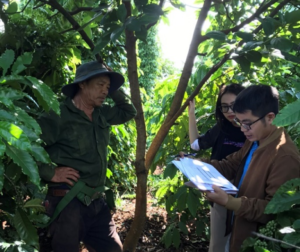
In 2020, 4C partnered with Simexco Dak Lak Ltd (SMC), major Vietnamese coffee exporter, in a pilot project in cooperation with IDH, the Sustainable Trade Initiative, and Jacobs Douwe Egberts (JDE) to calculate GHG emissions in coffee production. The process involves multiple stages, such as supply chain mapping, filling in and analyzing data templates as well as setting up the first calculator draft. Based on the calculation results, corresponding measures will be developed to reduce and mitigate GHG emissions.
“This partnership is one more step in JDE’s commitment to work continuously toward 100 % responsibly sourced coffee and tea by 2025,” said JDE’s sustainability manager in Asia and the Pacific, Do Ngoc Sy. “In addition to IDH’s foundational support, we are pleased to benefit from 4C’s expertise in calculating carbon emissions in coffee production, which is essential for us to calibrate our efforts and reach our sustainability goal.”
Tran Quynh Chi, Regional Director Asia Landscape, IDH – The Sustainable Trade Initiative also emphasized: “Calculating carbon emissions in coffee supply chain of Simexco Dak Lak brings added value to our pilot of large-scale sourcing areas in the Central Highlands of Vietnam.” She added: “We need in-depth calculation and analysis to know how it helps farmers increase their profitability and transform the coffee sector from a source of carbon emission to a sink. With this partnership, we are moving in the right direction to start from a small scale pilot to larger scale application of the methodology”.
This project is an important milestone for 4C on its way to establishing a “4C Climate Friendly” Add-On to the certification standard. “European consumers become more and more concerned with environmental footprint of products they buy. We developed additional logo to enable coffee producers, traders, brand owners and roasters to indicate their efforts to improve their GHG footprint, – says Norbert Schmitz.
Interested in measuring carbon footprint of your coffee? Contact us via info@4c-services.org.
About IDH
IDH, the Sustainable Trade Initiative, brings governments, companies, CSOs and financiers together in action driven coalitions. We orchestrate the powers of law, of entrepreneurship and investments to work together to create solutions for global sustainability issues at scale. We work in multiple sectors and landscapes in Africa, Asia and Latin America with over 600 companies, CSOs, financial institutions, producer organizations and governments towards sustainable production and trade. Read more at www.idhsustainabletrade.com.
About JDE
For more than 265 years we have been inspired by our belief that it is amazing what can happen over a cup of coffee. Today our portfolio is available in over 100 countries through iconic brands including: Jacobs, Tassimo, Moccona, Senseo, L’OR, Douwe Egberts, Super, Kenco, Pilao & Gevalia. Learn more at www.jacobsdouweegberts.com.
About Simexco
Simexco Dak Lak Ltd (SMC), a state-owned company founded in 1993, is recognized as one of the leading coffee exporters of Vietnam, the largest Robusta producing country in the world. Annual exports of SMC range from 1,3 to 2 million bags (60 kg) of coffee, representing 8% of coffee production in Vietnam. Since joining 4C in 2010, SMC has involved 4605 farmers whose farms were selected for improvement of agricultural and fair trade practices and to create a sustainable coffee community. More information under www.simexcodl.com.vn/.
Since joining the 4C program in 2010, major Vietnamese coffee exporter Simexco Dak Lak Ltd (SMC) has involved 4605 farmers first in the 4C verification and then, starting from 2018, the certification system. The participating farms, which were selected for the improvement of agricultural and fair trade practices and to create a sustainable coffee community, are located in SMC’s main sourcing areas: the communes of Eakao, Buon Trap, Eatan, Eatoh, DlieYang, Ea Hiao, Eadrong in Dak Lak Province, Vietnam’s Central Highlands.
Founded in 1993, Simexco Dak Lak Ltd (SMC) has built a dynamic purchasing network directly from the farm gates and plantations and invested in modern coffee processing factories and staff capacity building. Implementation of the sustainability criteria towards more responsible coffee production set by the 4C Code of Conduct contributed to the improved production methods and better farmer livelihoods.
SMC’s Sustainable Team highlights that “since joining 4C, SMC has seen positive impacts on farmers’ lives with regards to economic, social, and environmental aspects”. They are optimistic about future development, recalling the progress achieved so far: “the general awareness of farmers has greatly improved. Today farmers are confident about applying fertilizers according to the usage criteria and handling pesticide bottles and containers properly to prevent harming the environment. They have successfully applied good agricultural practices on their coffee farms and already experience multiple advantages of sustainable farming.”
Water conservation
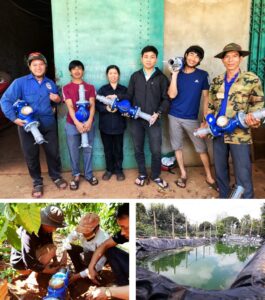 Coffee farmers in SMC’s main sourcing areas have to water their crops four to five times per season. According to the original irrigation method, each turn used about 600 liters of water per tree, not only wasting this valuable natural resource but also requiring significant human effort. With the help of a water meter, farmers are now able to measure the amount of water just enough for each irrigation session, which results in water savings of about 30% compared to the previous irrigation method. Besides, farmers can apply fertilizer through the irrigation system to save time and labor, to reduce farming costs and fertilize regardless of the weather. New water storage ponds have also helped farmers to alleviate the problem of irrigation during the dry season and contributed to improved farmers’ livelihoods by offering opportunities for fish and seafood farming.
Coffee farmers in SMC’s main sourcing areas have to water their crops four to five times per season. According to the original irrigation method, each turn used about 600 liters of water per tree, not only wasting this valuable natural resource but also requiring significant human effort. With the help of a water meter, farmers are now able to measure the amount of water just enough for each irrigation session, which results in water savings of about 30% compared to the previous irrigation method. Besides, farmers can apply fertilizer through the irrigation system to save time and labor, to reduce farming costs and fertilize regardless of the weather. New water storage ponds have also helped farmers to alleviate the problem of irrigation during the dry season and contributed to improved farmers’ livelihoods by offering opportunities for fish and seafood farming.
Gender equality
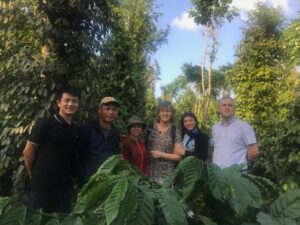 In the past, men mainly managed household finances and participated in training sessions. However, within the framework of the 4C program, farmers started participating in trainings on gender equality and female empowerment. Women now work on the farm together with their husbands. They have appropriate financial management plans, directly participate in trainings with the rate up to 50%, have additional access to technologies, and are able to further self-learning and sharing from each other. Women actively voice their opinions and raise issues for discussion together. Trainings have also increased men’s ability to take responsibility for childcare, housework and household management.
In the past, men mainly managed household finances and participated in training sessions. However, within the framework of the 4C program, farmers started participating in trainings on gender equality and female empowerment. Women now work on the farm together with their husbands. They have appropriate financial management plans, directly participate in trainings with the rate up to 50%, have additional access to technologies, and are able to further self-learning and sharing from each other. Women actively voice their opinions and raise issues for discussion together. Trainings have also increased men’s ability to take responsibility for childcare, housework and household management.
Improving the environment and economy
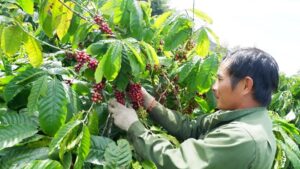 The farming environment has also been significantly improved with balancing the microclimate in the garden through the intercropping of coffee and other crops, resulting in improved farmer income through years of participating in the sustainable coffee production program. The increased environmental and social consciousness of farmers participating in the 4C program also has a positive spillover effect, affecting non-program farmers and contributing to their motivation to engage in the more sustainable production of coffee as well.
The farming environment has also been significantly improved with balancing the microclimate in the garden through the intercropping of coffee and other crops, resulting in improved farmer income through years of participating in the sustainable coffee production program. The increased environmental and social consciousness of farmers participating in the 4C program also has a positive spillover effect, affecting non-program farmers and contributing to their motivation to engage in the more sustainable production of coffee as well.
“4C is proud to support Vietnamese farmers and delighted to see how Simexco Dak Lak is driving sustainability in coffee production,” says Viet Ha Nguyen, Sustainability Manager in Asia and Oceania, 4C Services GmbH.
About Simexco
Simexco Dak Lak Ltd, a state-owned company founded in 1993, is recognized as one of the leading coffee exporters of Vietnam, the largest Robusta producing country in the world. Annual exports of Simexco Daklak range from 1,3 to 2 million bags (60 kg) of coffee, representing 8% of coffee production in Vietnam. More information under www.simexcodl.com.vn/.
About 4C
4C is the largest certification system for the sustainable cultivation and processing of coffee. 4C coffee is produced in 24 countries by more than 400.000 farmers. This covers a total green coffee production of 26,8 million bags (60 kg) on 970 thousand hectares of farm area.[1] Independent third-party audits, conducted by auditors of 23 certification bodies cooperating with 4C, ensure farmer compliance with the sustainability criteria of the 4C standard. More information under www.4c-services.org.
[1] Year of reference: 2019.
GCP’s snapshot provides insights into sustainable coffee purchases of the leading roasters – 4C certified coffee has the largest reported share
Five leading roasters, Nestlé, JDE, Melitta, Supracafé, and Strauss Coffee, reported their sustainable coffee purchases within the framework of GCP’s “Call to Action to Collectively Address the Coffee Price Crisis”.
GCP has launched a reporting system to encourage open and transparent discussion on sustainable coffee sourcing. The above mentioned roasters demonstrated their unprecedented commitment in revealing their companies’ data to demonstrate their progress.
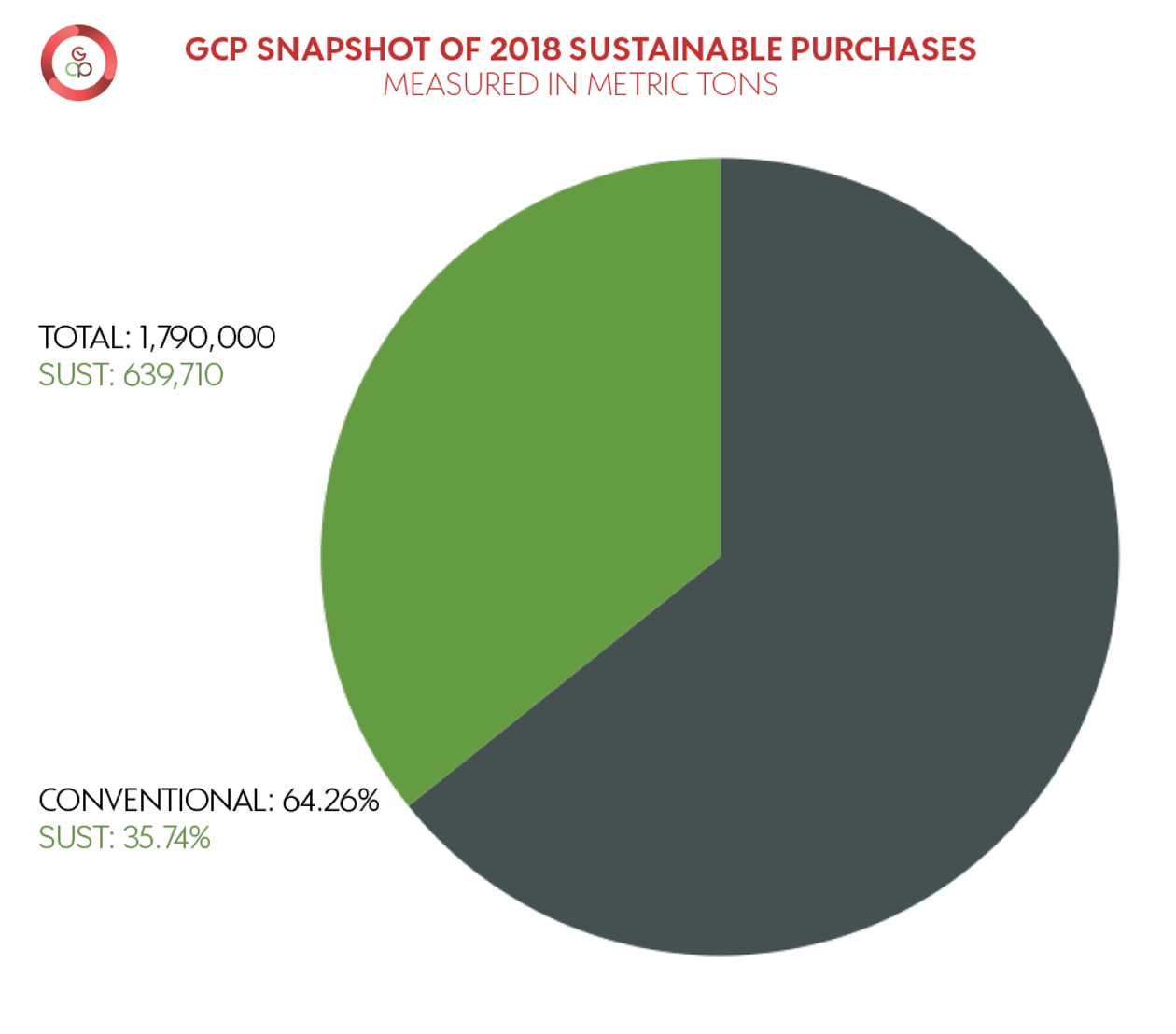
In total 1,79 million mt of green coffee was purchased, out of which 639,710 mt, or more than 30%, were purchased in line with GCP-recognized sustainability schemes. The majority of reported coffee purchases, or 65.6%, were 4C certified, followed by 12% purchased as 4C-RA double certified[1]. Estimated production of 4C coffee in 2018 was 2.1 million mt with Vietnam, Brazil, and Colombia among the top three origins.
Certification is a vital part of a robust sustainability strategy in the coffee sector. Roasters continue working with sustainability standards in combination with developing their programs, projects, and participating in multi-stakeholder sustainability initiatives.
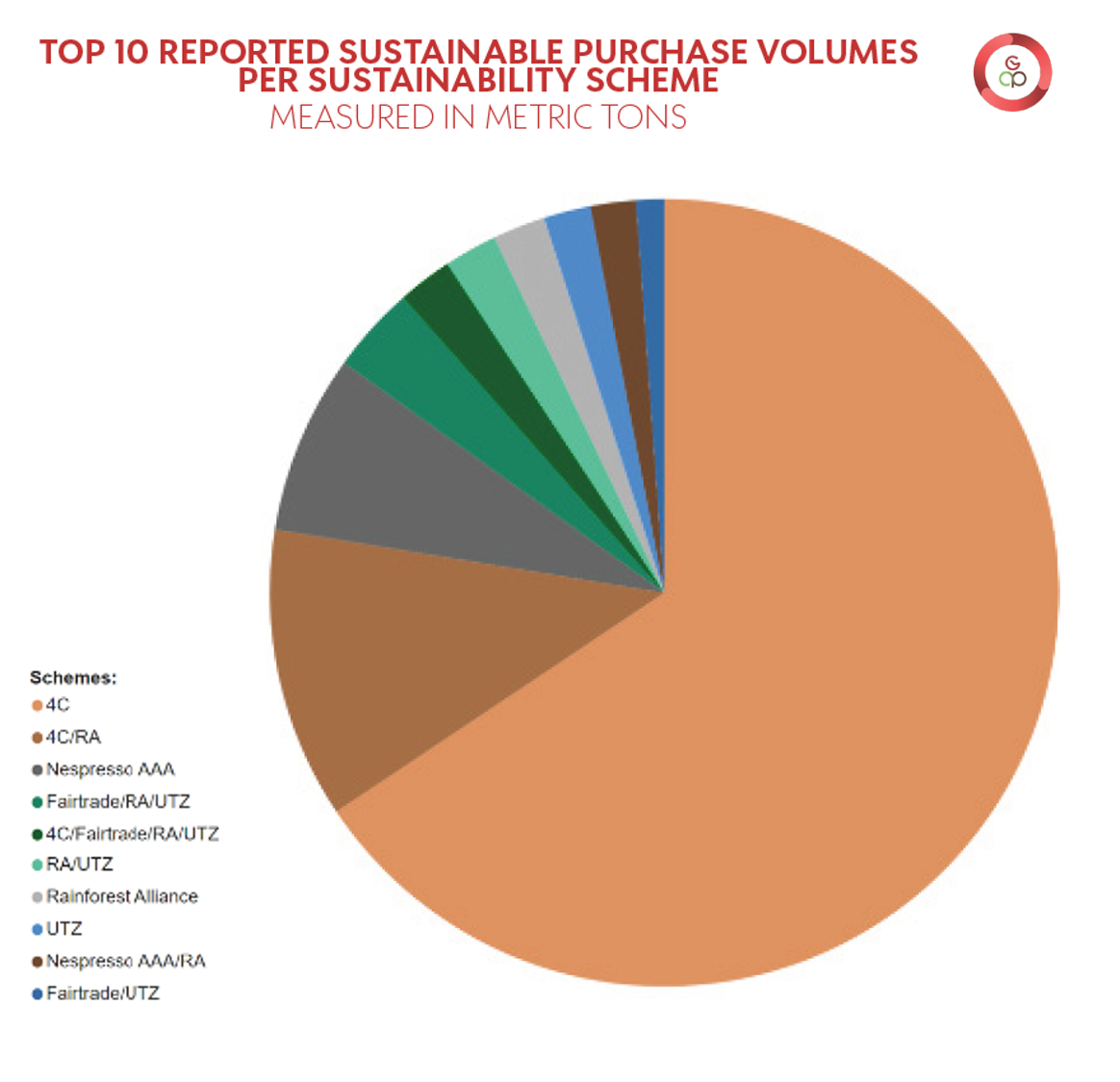
As highlighted in Melitta’s statement, “only a combination of measures along the value chain, like collaboration with Voluntary Sustainability Standards (e.g. Rainforest Alliance, 4C and Fairtrade), systemic approaches for sustainable regions, qualification and community projects in key coffee growing regions as well as sector engagement, e.g. in GCP, will lead to sustainable success for coffee.”
Another example is Strauss Coffee which focuses on its in-house “More than a Cup” program to support specific themes in gender equality and women empowerment, “while continuing to use 4C as our reliable mainstream certification service“.
We at 4C appreciate roasters‘ efforts towards making the coffee sector more sustainable and hope that companies will increasingly source certified coffee in the future and further support on the ground projects to improve farmer livelihoods. In the meantime, we are determined to make sure that there is a sufficient supply of genuinely sustainable coffee.
[1] Phase-out of Rainforest Alliance certificate recognition was launched in April 2020. For more information, please see System Update No. 5, 6 April 2020, here.
Further Information – Downloads and Links:
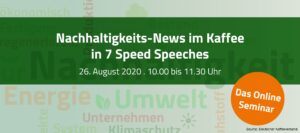
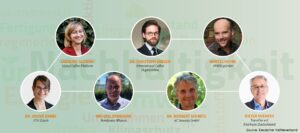
The online seminar “Sustainability news in coffee”, organized by the German Coffee Association, aims at sharing the latest news on coffee and sustainability. 7 presentations will give a 360-degree overview of the developments in the past six months. The topics cover green coffee price volatility during Corona, mobile devices for knowl dge transfer, certification, design of sustainable supply chains, and much more. Dr. Norbert Schmitz, the Managing Director of 4C Services GmbH, will provide useful insights on behalf of 4C on practical solutions for sustainable supply chains.
The event targets exclusively members of the German Coffee Association. To learn more about the online seminar, its program, and speakers, as well as to register, please follow this link.
How Does the Coffee Supply Chain Become Good for People and the Environment?
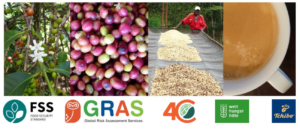 Discussion on the introduction of the Supply Chain Act* was sparked at both the German and European level. How could this law be possibly implemented? This is the main question that triggered the critical online dialogue on 15 September 2020, organized by Welthungerhilfe. Concrete approaches from the coffee sector will be presented in four keynotes on the topics of protection of the human right to food, certification, use of remote sensing for the documentation of coffee sites, and empowerment.
Discussion on the introduction of the Supply Chain Act* was sparked at both the German and European level. How could this law be possibly implemented? This is the main question that triggered the critical online dialogue on 15 September 2020, organized by Welthungerhilfe. Concrete approaches from the coffee sector will be presented in four keynotes on the topics of protection of the human right to food, certification, use of remote sensing for the documentation of coffee sites, and empowerment.
The keynote speakers are Nanda Bergstein, Director Corporate Responsibility, Tchibo; Dr. Rafaël Schneider, Coordinator of the FSS Project, and Deputy Director Policy Department at Deutsche Welthungerhilfe e. V.; Dr. Jan Henke, Managing Director of GRAS System and Dr. Norbert Schmitz, Managing Director of 4C Services GmbH.
To see the detailed agenda and register, please click the link below. The event will be conducted in German. Registration is open until 13 September 2020. Register here.
Further Information – Downloads and Links:
In a joint statement, 33 stakeholders of the Sustainable Agricultural Supply Chain Initiative [1], among them 4C, have committed themselves to the Supply Chain Act.
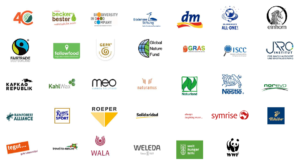
“We pledge our support to the German government for a national supply chain law and an ambitious European regulation.”
The Supply Chain Act lays out the responsibilities of German companies with regards to their supply chains and envisions obliging companies to take a proactive approach against human rights and environmental violations. This act will be soon proposed to the German parliament.
Actively supporting the Supply Chain Act signifies the willingness to take responsibility together with the German government to make an effort and do whatever is in one’s power to establish more sustainable and transparent supply chains.
To read more and download the statement, please follow the link.
[1] The Sustainable Agricultural Supply Chain Initiative (INA) brings together numerous actors from the private sector, civil society, and politics. Together they want to achieve more sustainability in global agricultural supply chains and improve farmer living conditions.